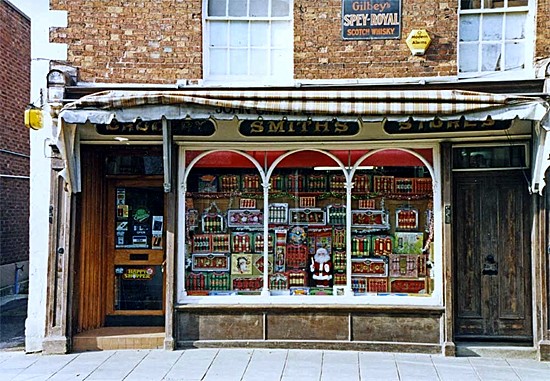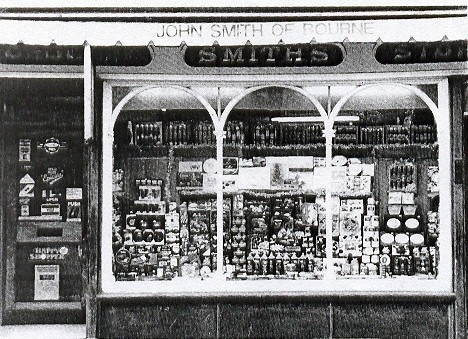|
John Smith of Bourne
A
LITTLE CORNUCOPIA

UNDER THE gold lettering that announces Smith's Grocery Stores is a
cornucopia of a shop window boasting caddies, jars, tins, boxes of myriad
shapes and sizes and exotic content. Push open the door and you are
greeted with the aroma of freshly ground coffee beans and the scent of
spice. The counter is of mahogany, the floorboards are bare and the back
of a conveniently placed chair retells the advertising slogan of a
forgotten age: "Watsons matchless cleanser is the best soap for all
purposes."
Behind the counter, intriguing drawers can be pulled open by tiny crystal
knobs to reveal such treasures as juniper berries, whole nutmegs, ginger
and aniseed. To serve you is the white coated, rosy cheeked proprietor,
John Smith, wife Judith and 'sister' Marjorie Spencer, who came as an
evacuee from Hull during the Second World War and stayed.
If blue bags of starch, carbolic soap or black lead have long since
dropped off your shopping list as unobtainable, a trip here to North
Street, Bourne, will see them reinstated. For it is John Smith's
stock-in-trade to supply the unusual, speciality goods that are shunned by
supermarkets.
Here can be found smoked oysters in cottonseed oil, baby pears in white
port, Australian lexias and Carlsbad plums. "We are often surprised by
items that customers say that they can't get and we think of as everyday",
chuckles John.
It has been John's policy over the years to supply products at the quality
end of the market and the store is well placed to continue to provide a
complementary service characterised by a gentlemanly air of courtesy in an
age when self service and a pile 'em high attitude to retailing is king.
Longevity, hard work and the ability to father sons has cemented this
family dynasty which originated with the founder who came from a large
farming family in Claypole. Sharing his name with his great grandson, John
Annible Smith opened the shop in 1857. He was a strict teetotaller who
sang in Bourne Abbey choir for fifty years and was succeeded by his son,
Charles Aquilla.
The subsequent heir to this thriving grocery, again named John, married a
baker's daughter from East Street, Crowland, and hence endowed his son
with impeccable credentials to carry the business forward into the
uncharted competitive waters of today.
"We have strived to retain the standards that have held us in good stead
over the years. Our customers can buy products in small quantities, goods
are delivered and accounts sent monthly", explains John, reading the 1913
delivery arrangement which showed the carrier travelling as far as
Folkingham in the north and Market Deeping in the south, servicing stately
homes at Grimsthorpe and at Irnham. Stabling was available on the shop's
premises, where, too, the family lived until the Second World War.
"That was just as well", recalls John. "I remember being told of a time
when the shop stayed open until 10 pm and on a Saturday night the last
customers came out of the nearby Nag's Head at 9.55 pm."
John can also remember being told of a time when cold lunches were served
to regular customers on market day when the shop became a meeting place,
hung with hams and replete with butter and cheese made locally.
"At one time, we took butter on to sell at Grantham which in turn was
supplied to the Nottingham market." Until relatively recently, Smith's
sent Stilton cheese all over the world but modern regulations have stemmed
this activity.
Now employing five staff, including three of the family, John Smith
retains the 1862 certificate of indenture of John Tirrell, son of farmer
Phillip, of Horbling. Destined to live with the family for the three years
of his apprenticeship, he was precluded from "haunting taverns or
playhouses, playing at cards or dice tables" while he was strictly
forbidden from "absenting himself from his master's services".
Many of the shop's suppliers date from this time, though as is now common
the old brand names have long since been taken over. The long-established
independent firm of Petty Wood & Co supply well-known, good quality brand
names such as Epicure and Jacksons. Coffee and tea merchants Waiter
Williams supplied Smith's from the year dot but are now subsumed into
Twinings and it is to them that John must go for the Blue Mountain
Jamaican blend of coffee which he confesses is his tipple for the most
special of occasions.
The 1913 price list is a feast for the eyes. H J Heinz & Co's Baked Beans
were selling at 6½d. per tin. Oxo came in bottles and Symington's gravy
mix has only just disappeared. Much lamented are the Zoological, Iced
Playmate and Cafe Noir Biscuits sold loose from tins with glass tops. What
became of Captain White's Oriental Pickle, Harry Peck's Potted Pheasant
and Lusty's Real Turtle Extract - a fine turtle consomme, the ideal pick
me up, sustaining and nourishing and one shilling per bottle?
No longer is sugar weighed into blue bags or golden syrup and vinegar
dispensed from barrels. Great Grandfather may well turn in his grave now
that his shop also includes a Wine Spirit and Cider Merchants. But for
some exceedingly tempting delicacies and a slice of history this is the
real McCoy.

NOTE: Colour photograph by Geoff Bell, December 1994.
Article by Judy Stevens reproduced from Lincolnshire Life
magazine for 24th February 1993, photograph by Daphne Webb.
See also 140 years of trading
Return to
Smith's of Bourne

Go to:
Main Index Villages
Index
|

